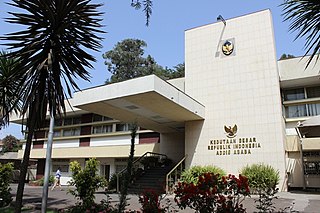Related Research Articles

Haile Selassie I was Emperor of Ethiopia from 1930 to 1974. He rose to power as Regent Plenipotentiary of Ethiopia (Enderase) for Empress Zewditu from 1916. Haile Selassie is widely considered a defining figure in modern Ethiopian history, and the key figure of Rastafari, a religious movement in Jamaica that emerged shortly after he became emperor in the 1930s. Before he rose to power he defeated Ras Gugsa Wole Bitul(Nephew of Empress Taitu) of Begemidr(present Gondar) at the Battle of Anchem in 1928 .He was a member of the Solomonic dynasty, which claims to trace lineage to Emperor Menelik I, believed to be the son of King Solomon and Makeda, the Queen of Sheba.

Addis Ababa is the capital and largest city of Ethiopia. In the 2007 census, the city's population was estimated to be 2,739,551 inhabitants. Addis Ababa is a highly developed and important cultural, artistic, financial and administrative centre of Ethiopia.

Addis Ababa University (AAU) is a national university located in Addis Ababa, Ethiopia. It is the oldest university in Ethiopia. AAU has thirteen campuses. Twelve of these are situated in Addis Ababa, and one is located in Bishoftu, about 45 kilometres (28 mi) away. AAU has several associated research institutions including the Institute of Ethiopian Studies. The Ministry of Education admits qualified students to AAU based on their score on the Ethiopian University Entrance Examination (EUEE).
Wolters Kluwer N.V. is a Dutch information services company. The company is headquartered in Alphen aan den Rijn, Netherlands (Global) and Philadelphia, United States (corporate). Wolters Kluwer in its current form was founded in 1987 with a merger between Kluwer Publishers and Wolters Samsom. The company serves legal, business, tax, accounting, finance, audit, risk, compliance, and healthcare markets. It operates in over 150 countries.
The Fetha Negest is a theocratic legal code compiled around 1240 by the Coptic Egyptian Christian writer Abu'l-Fada'il ibn al-Assal in Arabic. It was later translated into Ge'ez in Ethiopia in the 15th century and expanded upon with numerous local laws. Ibn al-Assal took his laws partly from apostolic writings, and partly from former law codes of the Byzantine rulers.

Haramaya University (HU) is a public research university in Haramaya, Oromia Region, Ethiopia. It is approximately 510 kilometres (320 mi) east of Addis Ababa, Ethiopia. The Ministry of Science and Higher Education admits qualified students to Haramaya University based on their score on the Ethiopian Higher Education Entrance Examination (EHEEE).
Jim Chen is an American legal scholar known for his expertise in constitutional law. He holds the Justin Smith Morrill Chair in Law at Michigan State University College of Law. From 2007 to 2012, he served as the dean of the University of Louisville Brandeis School of Law.

Qey Shibir or Kay Shibbir, also known as the Ethiopian Red Terror, was a violent political repression campaign of the Derg against other competing Marxist-Leninist groups in Ethiopia and present-day Eritrea from 1976 to 1978. The Qey Shibir was an attempt to consolidate Derg rule during the political instability after their overthrow of Emperor Haile Selassie in 1974 and the subsequent Ethiopian Civil War. The Qey Shibir was based on the Red Terror of the Russian Civil War, and most visibly took place after Mengistu Haile Mariam became chairman of the Derg on 3 February 1977. It is estimated that 10,000 to 980,000 people were killed over the course of the Qey Shibir.

Law enforcement in Ethiopia is dealt with by the Ethiopian Federal Police at federal level and by regional police commissions in the Regions of Ethiopia. The Ethiopian Federal Police (EFP) was established in 1995 to serve the public, to ensure the observation of human and democratic rights and to maintain the safety and welfare of the public. Its stated duties are the enforcement of laws and safeguarding constitutional guarantees, the prevention, detection and investigation of crime, the coordination of national state police commissions and development of national policing standards. The EFP also has to provide operational support to regional police commissions.
However, local militias also provide local security largely independent of the police and the Ethiopian military. Corruption is a perennial problem, particularly among traffic police who solicited bribes.
The U.S. Department of State states that its contacts within the Ethiopian government report that the findings of investigations into abuses by local security forces, such as arbitrary detentions and beatings of civilians, are rarely made public. However, the Ethiopian government continued its efforts to train police and army recruits in human rights. During 2008 the government was seeking assistance from the International Committee of the Red Cross, the local non-governmental organization Prison Fellowship Ethiopia (JFA-PFE), and the Ethiopian Human Rights Commission to improve and professionalize its human rights training and curriculum. The JFA-PFE provided human rights training for police commissioners and members of the militia in 2008.

Richard Keir Pethick Pankhurst OBE was a British-Ethiopian scholar, founding member of the Institute of Ethiopian Studies, and former professor at the University of Addis Ababa in Ethiopia. His books have been reviewed in scholarly journals, with Edward Ullendorff calling his The Ethiopians as another testimony to his "remarkable diligence and industry in the service of Ethiopian studies". He is known for his research on economic history and socio-cultural studies on Ethiopia.
Eric Sedler is a founder and Chief Executive Officer of Kivvit, a public affairs and communications firm with offices in Chicago, Miami, New Jersey, New York and Washington D.C. Kivvit provides communications planning, message development, digital, advertising, media relations and content production services to major companies, industry associations, non-profits, government agencies and advocacy organizations.

Getatchew Haile was an Ethiopian-American philologist widely considered the foremost scholar of the Ge'ez language and one of its most prolific. He was acknowledged for his contributions to the field with a MacArthur Fellows Program "genius" award and the Edward Ullendorff Medal from the Council of the British Academy. He was the first Ethiopian and the first African to win the award.
Alemayehu Fentaw Weldemariam is an Ethiopian constitutional law scholar, political theorist, conflict analyst, and a public intellectual.
The following is a historical events of Addis Ababa, the capital of Ethiopia, including its formation prior to 20th century by chronology.
The Institute of Ethiopian Studies(IES) was officially established in 1963 to collect information on Ethiopian civilization, its history, cultures, and languages. The Institute includes a research and publication unit, a library, and a museum. It is located at Addis Ababa University, Sidist (6) Kilo campus, which was at the time of the IES's opening, named Haile Selassie I University after the last emperor of Abyssinia.
Ethiopia was formerly one of Africa's major forces, and played in every Africa Cup of Nations until the end of 1960s. Ethiopia themselves also won an AFCON tournament, the 1962 edition, when they were the hosts. Since then, success has started to fade from Ethiopia's football and after 1982, Ethiopia would have to wait until 2013, when the country qualified for the final tournament after a 31-year absence.

The Embassy of the Republic of Indonesia in Addis Ababa is the diplomatic mission of the Republic of Indonesia to the Federal Democratic Republic of Ethiopia. The embassy is concurrently accredited to the Republic of Djibouti. In addition, the ambassador serves as the Indonesian representative for the African Union. The first Indonesian ambassador to Ethiopia was Suadi Soeromiharjo (1964–1968). The current ambassador, Al Busyra Basnur, was appointed by President Joko Widodo on 7 January 2019.

Ethnic discrimination in Ethiopia during and since the Haile Selassie epoch has been described using terms including "racism", "ethnification", "ethnic identification, ethnic hatred, ethnicization", and "ethnic profiling". During the Haile Selassie period, Amhara elites perceived the southern minority languages as an obstacle to the development of an Ethiopian national identity. Ethnic discrimination occurred during the Haile Selassie and Mengistu Haile Mariam epochs against Hararis, Afars, Tigrayans, Eritreans, Somalis and Oromos. Ethnic federalism was implemented by Tigray People's Liberation Front (TPLF) leader Meles Zenawi and discrimination against Amharas, Ogaden, Oromos and other ethnic groups continued during TPLF rule. Liberalisation of the media after Abiy Ahmed became prime minister in 2018 led to strengthening of media diversity and strengthening of ethnically focussed hate speech. Ethnic profiling targeting Tigrayans occurred during the Tigray War that started in November 2020.

Since the new constitution of Ethiopia enacted in 1995, Ethiopia's legal system consisted of federal law with bicameral legislature. The House of People's Representatives (HoPR) is the lower chamber of bicameral legislature of Federal Parliamentary Assembly with 547 seats and the House of Federation with 108 seats, the former vested on executive power of Prime Minister and the Council of Ministers, and the latter have authority to interpret federal law and oversees regional and federal decisions.

Opposition to Haile Selassie relied largely of internal administration of his country. While Haile Selassie made attempt to modernize the country and brought to global power since Italy's occupation in 1936–41, the later administration met with negative public attitude especially among educated people in universities and peasants.
References
- 1 2 3 University, Wayne State. "Robert Sedler - Wayne Law - Wayne State University". law.wayne.edu. Retrieved 2018-01-20.
- ↑ "AJC Detroit Honors Rozanne and Robert Sedler > Oakland County Legal News". www.legalnews.com. Retrieved 2018-01-20.
- ↑ "Interview with Robert Sedler | Pass the Word". passtheword.ky.gov. Retrieved 2018-01-20.
- ↑ Sachs, David. "Professor Robert Sedler: A Champion of Justice — Detroit Jewish News". The Jewish News. Retrieved 2020-08-07.
- ↑ "Law students thank professor following final lecture > Macomb Legal News". legalnews.com. Retrieved 2020-12-29.
- ↑ Gora, Joel M., An Essay in Honor of Robert Sedler: Fierce Champion of Free Speech (2013). Wayne Law Review, Vol. 58, p. 1087, 2013; Brooklyn Law School, Legal Studies Paper No. 365. Available at SSRN: SSRN 2376950
- ↑ Sedler, Robert Allen (1968). Ethiopian Civil Procedure. Faculty of Law, Haile Sellassie I University.
- 1 2 "Faces of Liberty: Robert Sedler". ACLU of Kentucky. 2015-05-21. Retrieved 2018-01-20.
- ↑ "Author Page for Robert A. Sedler :: SSRN". papers.ssrn.com. Retrieved 2018-01-20.
- ↑ Addis Ababa University Library Catalogue, author's page http://libcat.aau.edu.et/cgi-bin/koha/opac-search.pl?q=au:Sedler,%20Robert%20Allen. accessed on 2 Nov 2022
- ↑ "Constitutional Law in the United States, Third edition | Wolters Kluwer Legal & Regulatory". Wolters Kluwer Legal & Regulatory. Retrieved 2018-01-20.
- ↑ Sedler, Robert Allen; Practice, American Bar Association Section of General (1989). Across state lines: applying the conflict of laws to your practice. American Bar Association, Section of General Practice. ISBN 9780897074087.